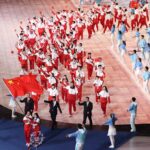As US lawmakers push to block China’s AI startup DeepSeek from government devices, citing security concerns, global tech experts highlight the potential innovations the software could unlock.
DeepSeek will be a key discussion point at the upcoming AI Summit in Paris. Some analysts believe its growing recognition underscores the reality that efforts to limit Chinese technology will likely falter, as breakthroughs in innovation tend to bypass political barriers.
While DeepSeek’s advancements disrupt the AI space, US lawmakers are moving forward with plans to block the app on government devices.
On Thursday, the Associated Press reported that Representatives Josh Gottheimer (D-N.J.) and Darin LaHood (R-Ill.) introduced the “No DeepSeek on Government Devices Act,” expressing concerns about potential data misuse and misinformation tied to the Chinese government.
Several US allies have also restricted or banned DeepSeek, citing security risks. In response, Chinese Foreign Ministry spokesperson Guo Jiakun stated that China respects and protects data privacy under its laws.
He emphasized that the government has never and will never request companies or individuals to collect data unlawfully.
DeepSeek Speech Control
Guo added that China has consistently opposed the politicization of trade and technology, reaffirming its commitment to safeguarding the rights of Chinese companies. According to Li Baiyang, an associate professor at Nanjing University, the perceived “security risks” are largely based on political bias.
He noted that many Western nations struggle to embrace advanced technology from China.
A report by the Voice of America claimed that DeepSeek could enable “speech control” and “public opinion manipulation.” I dismissed these claims as baseless, highlighting that DeepSeek’s transparent reasoning process reduces bias and enhances clarity.
When asked about AI collaboration between China and the U.S., Fu Cong, China’s permanent representative to the UN, stated that restricting technology is ineffective. He argued that both nations, as AI leaders, must work together.
Fu also criticized the US for its history of banning Chinese companies, including Huawei, TikTok, and now DeepSeek, suggesting such actions hinder progress.
Liu Dingding, a technology analyst, commented that recent bans in countries like Italy and Australia are driven more by DeepSeek’s impact on global power dynamics than genuine security concerns.
DeepSeek’s achievements show that AI success doesn’t require vast resources or monopolistic control, challenging long-standing industry assumptions.
US Tech Race with China
Representative LaHood defended the proposed ban, stating the US “cannot afford to lose” the technology race with China. He stressed the importance of safeguarding American data and maintaining leadership in AI.
According to Li, comments like these reveal the US strategy of using policies to preserve dominance in the AI sector, often prioritizing control over accessibility.
Despite political efforts to restrict DeepSeek, tech leaders embrace its cost-effective solutions. A February Reuters report highlighted how the platform is helping companies access AI technology at a fraction of the usual cost, levelling the playing field for smaller firms, particularly in Europe.
DeepSeek is also expected to be a major topic at the 2025 AI Action Summit, which is scheduled for February 10. An article by the U.S.-based think tank New America criticized the growing “digital isolationism” among American policymakers.
It pointed out that DeepSeek’s achievements, including its ability to operate under semiconductor sanctions, challenge the effectiveness of such restrictions.
Li noted that the widespread recognition of DeepSeek within the tech community indicates that political decisions to ban the platform are primarily aimed at China rather than addressing genuine technology issues.
He added that despite attempts to block Chinese innovation, significant advancements will continue to break down barriers, proving difficult to contain.
Related News:
DeepSeek Training Sessions Flourish in China After Successful Launch

Geoff Thomas is an award winning journalist known for his sharp insights and no-nonsense reporting style. Over the years he has worked for Reuters and the Canadian Press covering everything from political scandals to human interest stories. He brings a clear and direct approach to his work.














